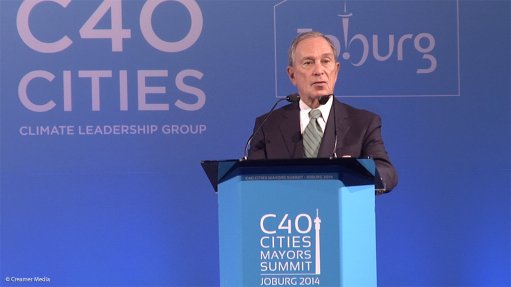
C40 president Michael Bloomberg
The international community is increasingly looking toward cities for leadership with regard to fighting climate change, C40 president and former New York mayor Michael Bloomberg said on Wednesday.
Speaking at the C40 Summit, in Sandton, he said this was a big step forward as “the impact of cities [in combating climate change] can not be underestimated”.
Also speaking at the summit, and launching the ‘Climate Action in Megacities 2.0’ report, which followed an initial report published in 2011, C40 executive director Mark Watts pointed out that between 2008 and 2013 the number of reported climate change response actions in cities had doubled from 4 700 to nearly 8 100.
He explained that this increase could, in part, be attributed to 23 new cities participating in the 2013 survey; however, if a like-for-like comparison was undertaken on the 36 cities that participated in both the 2008 and 2013 survey, there was still a 41% increase in responsive action.
Watts further said the scale of individual climate responsive actions was also increasing, with many projects having progressed to a transformative, citywide scale.
The report also showed that, while mayors were undertaking a range of initiatives, they were focusing on areas where they could make the most significant difference, with 20% of all climate change combating actions focused on reducing the electricity use of buildings.
“Cities know what needs to be done and now have to focus on the ramping up of projects and getting the necessary finance,” Watts said, adding that the future of climate change activity would be similar to what was happening at present but on a much larger scale.
“The data is showing that what cities are doing does have an impact and that there is great potential for cities to make an even bigger difference [in future],” he noted.
JOHANNESBURG
Delivering the welcoming address at the summit, City of Johannesburg executive mayor Mpho Parks Tau said Johannesburg was also doing its part to combat climate change, stating that through a number of initiatives, which included demand-side management, the city had reduced its electricity consumption by 20% per capita since 2008.
He noted that “in real terms, [the city has] reduced its electricity consumption by 4% over the past two years and this has had a major impact on the reduction of greenhouse gases from a demand-side point of view”.
Further, with the implementation of green transport systems, such as the Rea Vaya bus rapid transit system, about 380 000 t/y of carbon dioxide (CO2) emissions was saved and, once the systems were fully implemented, six-million tons of CO2 a year would be saved by 2015.
Tau also pointed out that , currently, 87% of Johannesburg’s electricity was derived from coal.
“[However], as a country we acknowledge that while we are a society that continues to consume energy and electricity that is generated through coal, there is a need to transition to alternative fuels,” he said, adding that there was a process under way to enable the city to get to a point where, in the early parts of the next decade, South Africa would see a significant reduction in the need for coal-generated power.